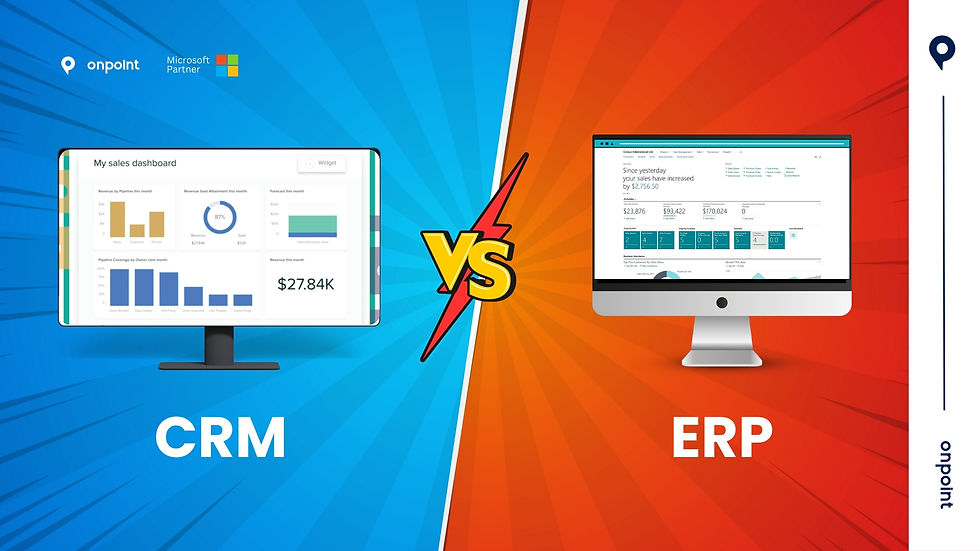CRM vs. ERP: Understanding Key Differences for Business Efficiency
- onpoint ltd

- Feb 17, 2025
- 3 min read

When businesses look to streamline operations, two critical software solutions come into play: Customer Relationship Management (CRM) and Enterprise Resource Planning (ERP).
While both systems improve efficiency, they serve different purposes. What is the difference between CRM and ERP? In simple terms, CRM software focuses on customer relationships, while an ERP system manages internal business processes like finance, HR, and supply chain management.
This article will break down ERP meaning, ERP system meaning, and CRM functionalities to help business owners, managers, and decision-makers understand CRM vs. ERP examples and choose the right solution.
What is CRM? (Customer Relationship Management)
CRM, or Customer Relationship Management, is a system designed to manage customer interactions, improve sales efficiency, and enhance marketing efforts. Businesses use CRM software to store customer information, track sales pipelines, and provide better customer service.
Core CRM Functionalities:
Contact Management – Centralized storage of customer data
Sales Tracking & Automation – Streamlining sales processes
Marketing Automation – Running targeted campaigns
Customer Support Tools – Managing customer inquiries efficiently
A CRM manager is responsible for implementing and optimizing these processes. For small businesses, a less annoying CRM with simple, user-friendly features can be beneficial.
What is ERP? (Enterprise Resource Planning)
ERP stands for Enterprise Resource Planning, a software system that integrates and automates internal business processes such as finance, HR, supply chain management, and manufacturing.
ERP System Meaning & Core Functionalities:
Financial Management—Budgeting, accounting, and reporting
Human Resources Management—Employee data, payroll, and benefits
Supply Chain & Inventory Management—Procurement, warehousing, and logistics
Manufacturing & Operations—Production planning and order management
What Does ERP Stand For?
ERP represents a comprehensive business management system, ensuring efficiency by consolidating core processes into a single platform.
What is the Difference Between CRM and ERP?
Key Differences:
Feature | CRM | ERP |
Purpose | Manages customer relationships | Manages internal business operations |
Focus | Sales, marketing, and customer service | Finance, HR, supply chain, and manufacturing |
Users | Sales reps, marketing teams, customer service | Finance, HR, operations, supply chain |
Benefit | Increases customer satisfaction and revenue | Optimizes internal processes and reduces costs |
In short, CRM software helps businesses grow revenue, while an ERP system ensures operational efficiency.
CRM vs. ERP Examples in Real-World Scenarios
CRM Example:
A retail business uses CRM software to track customer purchase history, send personalized marketing emails, and manage loyalty programs.
ERP Example:
A manufacturing company uses an ERP system to manage inventory levels, production schedules, and financial reporting—ensuring smooth operations.
Crm v Erp Examples Across Industries:
Healthcare – CRM for patient management; ERP for hospital resource planning
Finance – CRM for client relationship tracking; ERP for accounting and compliance
E-commerce – CRM for marketing automation; ERP for inventory management
Overlapping Areas Between CRM and ERP
While CRM and ERP serve different purposes, they often integrate to provide a complete business solution. Some ERP systems include CRM functionalities, and many businesses integrate CRM software with ERP systems for better data flow.
Benefits of Integration:
Seamless data sharing – Sales, inventory, and financial data in sync
Better forecasting – Combining customer insights with financial planning
Increased productivity – Reduced data entry and improved workflow efficiency
Choosing the Right System for Your Business
When to Choose CRM:
If your business focuses on customer engagement, lead generation, and sales tracking
If you need a less annoying CRM that’s easy to use
If you want the best CRM for small business to drive growth
When to Choose ERP:
If your company requires streamlined financial, HR, and supply chain management
If your industry involves manufacturing, logistics, or large-scale operations
If you need a centralized system for multiple departments
Some businesses may need both CRM and ERP, especially when scaling operations.
Conclusion
CRM and ERP systems serve distinct yet essential business functions. CRM software strengthens customer relationships, while an ERP system optimizes internal processes. Businesses should carefully evaluate their needs to choose the right solution or integrate both for maximum efficiency.
FAQs
1. What is the difference between CRM and ERP?
CRM focuses on customer interactions, while ERP manages business operations like finance, HR, and inventory.
2. Can a small business benefit from ERP, or is CRM enough?
For small businesses focused on sales, CRM software is often sufficient. However, companies with complex operations may benefit from ERP solutions.
3. How do CRM and ERP integrate?
Integrated sales, finance, and operations improve efficiency and forecasting, boosting profitability. Nucleus Research found CRM integration increased productivity and business growth by 20-30 percent.
4. Is ERP only for large enterprises?
No. Many ERP providers offer scalable solutions for small to mid-sized businesses, helping streamline operations.



Comments